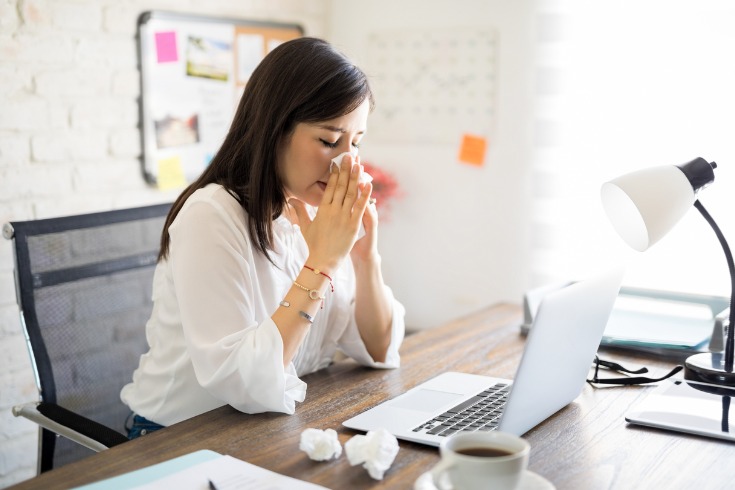
Those accrued hours of sick leave on a payslip are like a badge of honour for some employees. They proudly declare they have hundreds of hours of leave because they rarely get sick. But are they really never ill or do they just keep coming to work when they should be at home in bed?
Your Sick Leave Is There For a Reason
An employee can take sick leave when they can’t work because of illness or injury. In Australia you can take as much paid sick leave as you have accumulated. There’s no reason to come into work when you’re contagious. Staying away from work can be the best way to look after yourself and your colleagues.
Faster Recovery Time
If you’re suffering from a cold, flu or stomach bug, taking a day off work can help your recovery. If your immune system is working overtime fighting the virus, pushing your body to get up and go to work rather than staying home to rest can make you sick for longer.
You will recover faster by resting and getting more sleep than usual to give your immune system a boost.
Keep Your Colleagues Healthy
The truth is, your colleagues would much prefer you to use your sick leave and stay home with your germs, well away from them. Restricting their exposure to your infection is a good thing for them.
Sometimes powering through when you are under the weather is necessary, but showing up for work when you have a bacterial or viral infection is usually not a good thing. It’s likely you will pass your infection to your co-workers, some of whom may not be as healthy as you and recovering from a cold or flu could be a struggle for them.
Just because you didn’t take any time off work to recuperate, doesn’t mean your colleagues won’t. You could infect multiple colleagues and then your workplace has lost several days’ work to sick leave that might have been avoided.
When a colleague picks up a germ from work, they don’t leave it at work. They take it home and their immediate family members are at risk of catching it - and so the contamination goes on, infecting as many people as it is allowed to come into contact with.
Public Transport Risk
If you take a bus or train to and from work, it’s not just your colleagues who are at risk. According to a Professor of Microbiology, people who take the bus to work have six times the risk of getting sick because unwell people continue to go to work.
One sneeze or cough from you in a packed bus or train can infect dozens of people. Water droplets can travel great distances, past many unsuspecting commuters in the confined space of a train or bus.
Those people may fall victim and they infect their colleagues and family members. Within weeks, many people become ill because of one person using public transport instead of staying at home.
Productivity
You might decide you’re fine to go to work, but are you actually productive when you’re feeling under the weather? While your body is trying to eradicate every last part of your virus, you are rarely at peak performance. Often, we feel in a worse mood, can’t think straight and make more mistakes than when we feel well. Even small things make a difference such as, every time you stop to blow your nose or cough, you are disrupting your workflow and it takes up to 23 minutes to get back to productive work.
If you have a headache or that heavy brain fog, are you at risk of making a costly mistake? Being at work and not doing a full day’s work is called presenteeism and means you are there in body, but not a lot else is going on. Presenteeism costs the Australian economy $34 billion per annum.
Mental Health
Sick leave isn’t just for a physical illness. Some workers don’t take time off to rest or seek treatment for stress or depression until it is a major problem. When they finally take sick leave, the condition can be far more entrenched, meaning they need on average much more time than other workers compensation claims (15.3 weeks for mental health conditions compared to 5.5 weeks for all other claims).
If you are struggling with stress, depression or anxiety, you don’t need to suffer in silence. Give yourself a day or two off work. Sometimes you need a quiet day to bring some calm back and to think about some strategies you can use to reduce your daily stress levels. However, staying at home long term, is not a good thing for improving your mental health and can set up avoidant behaviour making it hard to go back. If you are struggling to find solutions to your stress, or you feel you have a heavy cloud over you that you just can’t seem to shift, it can be of great benefit to use the time to seek treatment and put a plan in place, rather than battling through a seemingly ever increasing set of problems on your own.
Ask to see your manager to discuss your workload, or HR to discuss a problem. Use your sick leave to seek help from your GP or psychologist. Your recovery time can be much shorter if you deal with a mental health issue early rather than later.
If you would like to talk with a qualified psychologist, contact PeopleSense by Altius on 1300 307 912 or (08) 9388 9000, or contact us online.